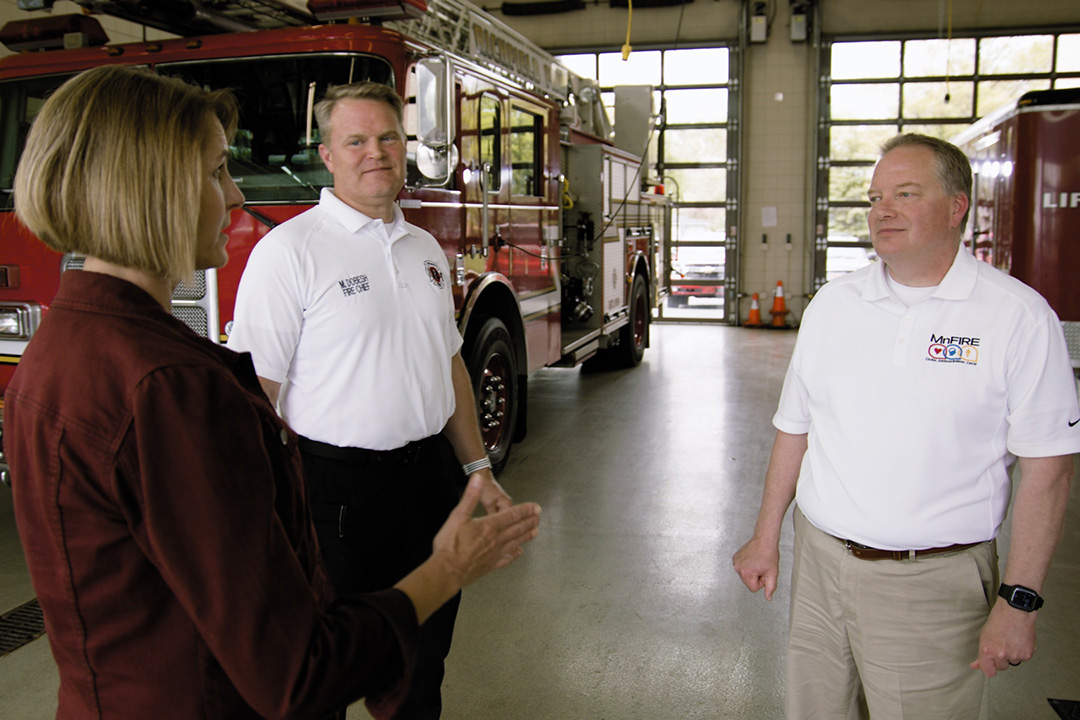Video
Supporting the unique needs of firefighters
When MnFIRE needed emotional wellbeing support for their firefighters, Optum stepped in to help.

Supporting the unique needs of firefighters
[MUSIC PLAYING IN THE BACKGROUND THROUGHOUT VIDEO]
[VIDEO OF A FIRETRUCK PULLING INTO A FIRE STATION]
WAYNE KEWITSCH VOICEOVER: I think the biggest thing that drove me to firefighting is you never know what's going to happen next.
[WAYNE KEWITSCH SPEAKING ON SCREEN]
[Text On Screen – Wayne Kewitsch, Executive Director, MnFIRE]
WAYNE KEWITSCH: It's truly the greatest job in the world. You get to help people in the worst time of their life.
[VIDEO OF FIRE STATION LOCKERS SHOWING FIREFIGHTERS’ GEAR]
Some of the things you see and the things that you're exposed to, most people will never see in their life. They get exposed to a lot of cumulative trauma.
[VIDEO OF FIREFIGHTER IN FULL GEAR LOADING EQUIPMENT ONTO A FIRE TRUCK]
Firefighters look at it and they say, I don't need that on. I'm tough enough. I can get through it. And they don't realize that some outside assistance could probably make a big difference for them.
[PICTURE OF A FREFIGHTER]
[PICTURE OF FIFREFIGHTERS AT A MNFIRE PRESENTATION]
That there is somewhat of a stigma about that, and one of the things that MnFIRE has been working on is getting rid of that stigma.
[PICTURE OF A FREFIGHTERS PUTTING ON GEAR]
There was no way we were going to effectively build a behavioral health organization that could cover every firefighter in the state. We just didn't have that expertise.
[VIDEO OF WAYNE KEWITSCH AND SHANNON FOULKES HAVING A MEETING]
[SHANNON FOULKES SPEAKING ON SCREEN]
SHANNON FOULKES VOICEOVER: Firefighters are very different than our typical employer groups, so we sat down and listened to what they were trying to solve for.
[Text On Screen – Shannon Foulkes, Sr. Client Executive, Optum]
One is that these 20,000 firefighters are located across the state of Minnesota, and they're not employees.
[PICTURES OF FIREFIGHTERS]
Ninety five percent are volunteers. They don't have a centralized job or a centralized place that they can obtain emotional health.
[WAYNE KEWITSCH SPEAKING ON SCREEN]
WAYNE KEWITSCH: Optum was very receptive.
[VIDEO OF WAYNE KEWITSCH AND SHANNON FOULKES TALKING TO A FIREFIGHTER IN THE FIRE STATION]
A lot of it was educating them about the fire service and firefighters and fire service culture. Firefighters, when they get to the point where they ask for help, a lot of times they're a lot farther along in the progression of possibly a crisis situation than the average individual.
[Text On Screen – Common areas of concern: Work stress, Trauma incidents, Relationships issues, Depression, Anxiety]
Work stress, trauma incidents, relationship issues, depression, anxiety, and that's where Optum really built the curated network of fire service aware, trauma aware clinicians.
[SHANNON FOULKES SPEAKING ON SCREEN]
SHANNON FOULKES: That is one of the unique characteristics of our emotional wellbeing program.
[VIDEO OF WAYNE KEWITSCH AND SHANNON FOULKES HAVING A MEETING WITH A FIREFIGHTER SHOWING HIM MNFIRE MATERIALS]
They talk to somebody who can help them in that moment, and that's what our master's level specialist can do. We've had over a thousand provider visits, so those are firefighters going to that curated network, seeing a provider that is familiar and trained in crisis and intervention and trauma.
[WAYNE KEWITSCH SPEAKING ON SCREEN]
WAYNE KEWITSCH: We have a dedicated provider specialist who understands what we're looking for in providers and making sure she vets those providers for us.
[SHANNON FOULKES SPEAKING ON SCREEN]
SHANNON FOULKES: So we give people lots of different options because we really want to meet them where they are and not everybody wants to get on the phone. Not everybody wants to drive down the street to go see a provider so there's virtual care as well. Because we're really trying to cast a wide net to get people what they need.
[WAYNE KEWITSCH SPEAKING ON SCREEN]
WAYNE KEWITSCH: We've had a couple people reach out and say the program really made a great difference for them. It really helped them. And it's not just the firefighters. We're also starting to see family members utilize the program, which is just as important.
[VIDEO OF FIREFIGHTERS PUTTING ON GEAR AND DRIVING OUT OF THE FIRE STATION IN A FIRETREUCK]
[SHANNON FOULKES SPEAKING ON SCREEN]
SHANNON FOULKES: We know that we're impacting firefighters every day. We have worked to really create something special for them.
[WAYNE KEWITSCH SPEAKING ON SCREEN]
WAYNE KEWITSCH: We have a great relationship with Optum. Minnesota really is on the cutting edge of firefighter health. They've really done a great job for the Minnesota Fire Service.
[Text On Screen – Optum, © 2023 Optum, Inc. All rights reserved. Customer story and image used with permission]
[END MUSIC]
Breaking down barriers to mental health support
Firefighters experience stress and trauma on a daily basis, which can result in depression, anxiety and relationship issues. In addition to the stress and trauma experienced on the job, stigma around mental health still prevents many firefighters from reaching out for help.
Optum partnered with MnFIRE to create an emotional wellbeing program built around these unique needs, including a curated network of trauma-aware providers. By helping firefighters and their families get the support they need, we’re making a difference in the moments that matter.


